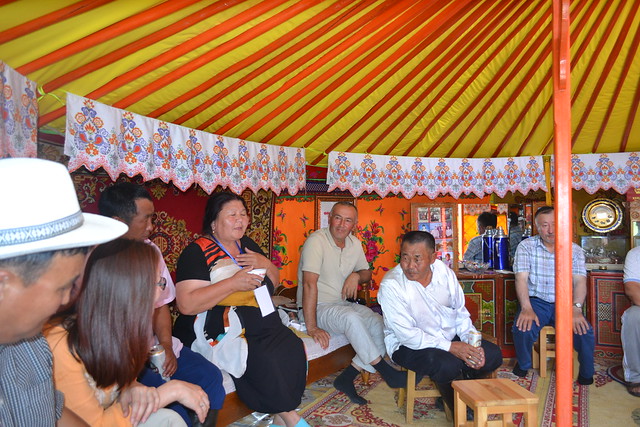New network of Central Asian pastoralists demands to be heard
Central Asian pastoralists want a say in decisions that affect them

Thirty-five pastoralist representatives in Central Asia have formed a network to voice the concerns of the region’s pastoralists to governments and development organizations. The organizations, from India, Kazakhstan, Kyrgyzstan, Mongolia, Russia, Tajikistan and Uzbekistan, founded the Central Asian Network of Pastoralists at a meeting in Mongolia on 25-29 July 2015.
The meeting, at the Hustai National Park, was organized and facilitated by the Mongolian Alliance of Nomadic and Indigenous Peoples (MANIP). It was one of the seven regional meetings coordinated and financed by FAO’s Pastoralist Knowledge Hub.
The assembly set up an action plan for the next two years. Two delegates from each country formed a provisional coordination committee to work on the charter, an election mechanism and means of communication for the new network. MANIP will act as the secretariat of the network for the first year.
The “Hustai Declaration on Pastoralism and Nomadic People for Central Asia”, prepared at the meeting, describes the role of the new network. The declaration calls on national governments, international organizations, the United Nations and civil society organizations to consult and include the Central Asian pastoralist network in workshops, conferences, policy processes and programmes that may affect pastoralism in Central Asia.
The new network aims to protect and advocate the mobility rights, customary laws, cultural traditions and products of pastoralist communities. It will make policy suggestions, seek collaboration and promote the exchange of experiences and knowledge within the network.
The representatives also emphasized that pastoralist communities need support in various technical areas, including veterinary services and in adding value to pastoralist products.
The representatives agree that pastoral livelihoods are well adapted to the dry and cold landscapes of Central Asia. Herding uses and manages rangelands in the most efficient and sustainable way. To do this effectively, pastoralist communities need access to large areas so they can cope with drought and climatic variation. They have to be able to make their own decisions on how to govern these rangelands.
The Hustai declaration demands that national and international policies and laws be aligned with FAO’s Voluntary Guidelines for the Governance of the Tenure of Land, Natural Resources and Fisheries.
Several communities that herd yaks were represented at the meeting. Yaks are kept in especially harsh environments, so the delegates agreed that their herders should be represented through a separate association. Such an association could be structured and organized in a similar way to the reindeer association that supports the interests of reindeer herders in Scandinavia, Russia and Canada.
The 5-day meeting was opened by the Deputy Minister of Food and Agriculture of Mongolia and by Yon Fernandez de Larrinoa, FAO’s Advocacy Officer on Gender and Indigenous Peoples. The opening ceremony included nomadic throat singing and “moring khuur” music, played on a traditional violin-like instrument.
The meeting discussed a wide range of topics, including traditional pastoralist foods, innovations in pastoralist societies, land tenure and environmental aspects. The participants debated the objectives and organization of a Central Asian network and compared it with existing civil society mechanisms such as Terra Madre, Slow Food and the Committee on World Food Security.
On the last day of the meeting, the participants visited the Hustai National Park to observe Przewalski’s wild horses, and visited the Bayansonginot pastoralist community living in buffer zone of the park.

